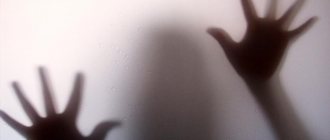Do some people really not dream?
Long-term observations of psychiatrists, somnologists and neurologists allowed us to formulate the conclusion that absolutely everyone dreams .
For example, the famous somnologist Patricia Garfield, one of the founders of the International Association for the Study of Dreams, wrote in her bestseller “Creative Dreaming” about the results of research confirming that every person sees 4-5 dreams per night .
Garfield notes that a person who says that he does not have dreams simply does not remember them. These statements are proven by the results of encephalograms of dozing patients. The devices did not detect the “presence of pictures” only in people with head injuries.
The expert of the European Society of Sleep Research, Alexander Kalinkin, shares the same opinion. He believes that all people see dreams, but not everyone remembers them.
Do you remember your dreams?
Yes
38.42%
No
61.58%
Voted: 203
Discussions on this topic continue, since the functioning of the brain, especially during sleep, has so far been little studied.
Why don’t I have dreams from the point of view of the zodiac horoscope?
Aries to a loss of mutual understanding with loved ones. Aries' dreams are also negatively affected by the systematic performance of monotonous, routine and boring work, from which representatives of this zodiac sign do not get any pleasure.
Taurus (people born from April 21 to May 21) may not dream due to recent emotional stress. Taurus often lack dreams due to systematic disruption of their life routine.
Geminis (people born from May 22 to June 21) often have difficulty dreaming due to groundless worries or fears. Representatives of the zodiac sign Cancer (people born from June 22 to July 22) may have no dreams due to constant conflicts and stressful situations.
Leos (people born from July 23 to August 21) do not have dreams due to worries about loved ones or criticism of them. Virgos (people born from August 22 to September 23) do not dream because of bitter disappointment in a loved one, whose opinion is of great importance to them.
The need for quick decision-making or sudden changes in the usual rhythm of life negatively affect the dreams of representatives of the zodiac sign Libra (people born from September 24 to October 23). Scorpios (people born from October 24 to November 23) may stop dreaming due to unfulfilled ambitions or mental exhaustion.
Representatives of the zodiac sign Sagittarius (people born from November 24 to December 22) stop dreaming due to a significant deterioration in their health or any suddenly appeared restrictions. Dreams for Capricorns (people born from December 23 to January 20) may disappear due to the lack of reliable support or dependence on the opinions of others.
Aquarians (people born from January 21 to February 19) often do not dream due to progressive mental illness or betrayal of a loved one. Pisces (people born from February 20 to March 20) have no dreams due to problems in their personal life or apathy.
The mechanism of dreams: when do they occur?
Some dreams help our brain store information and process thoughts, feelings and events of the day. Others may simply be the result of normal brain activity and mean little or nothing.
Scientists have not yet come to a common answer to the question of why people dream. But it is known at what moment dreams arise.
Let's start with the fact that a person's sleep period is divided into five phases, four of which are occupied by slow-wave sleep , and one phase by fast sleep (REM phase) .
REM and NREM sleep alternate throughout the night.
First, you fall into slow-wave sleep and go through all its stages, then the REM sleep phase begins. And this happens several times a night. This cycle is called the sleep cycle.
The number of cycles per night can vary from 4 to 6. Moreover, with each cycle the proportion of slow-wave sleep decreases, and the proportion of REM sleep gradually increases. A complete sleep cycle takes on average 90 to 110 minutes.
Scientists have found that a person dreams not only during REM sleep, but also in the slow-wave sleep phase. But the most vivid, lasting and memorable dreams come in the REM sleep phase.
Dream mechanism
With the help of a huge number of diverse studies, it was possible to establish that dreams do not appear immediately after falling asleep, but in strictly defined states of the human brain. Throughout the night, several phases of sleep alternate:
- Falling asleep . During this period, the body is just adjusting to relaxation, and dreams cannot arise. If a person falling asleep concentrates on closing their eyelids, they may see a variety of patterns - grids, lines, triangles, etc. These patterns may periodically rotate or change color, or remain stationary. Concentrating on closed eyelids helps you calm down and is an effective method of combating insomnia. During the falling asleep phase, a person may experience the illusion of falling, which is caused by muscle relaxation.
. The second stage of sleep provides deep peace and slowdown of all (including vital) body processes. Through the closed eyelids of the sleeping person, you can see the smooth circular movements of his eyeballs. The slow phase provides the body with complete rest and lasts from 40 minutes to several hours. Without going through it, it is impossible to see a dream.
slow sleep- REM or paradoxical sleep . The third period is characterized by sharp bursts of brain activity and increased muscle tone. The vital processes of the body return almost to the level of wakefulness, but the person continues to sleep - this is the brain’s response to the images flashing in it. Manifestations of sleepwalking make themselves felt precisely during the phase of paradoxical sleep, which lasts no more than 20 minutes, after which the body returns to deep relaxation.
- Awakening . Represents the restoration of normal activity of life processes. The ability to remember dreams depends primarily on the moment and quality of awakening: if a person woke up in the REM phase and gradually, he will certainly be able to reproduce the plot to the smallest detail, but if the dream was interrupted in the slow phase and/or by a sharp ringing of the alarm clock, a powerful external stimulus will displace all the impressions of what he saw. It is also worth noting that those subjects that are usually remembered are those that visited the dreamer closer to the morning.
Having an idea of all stages of rest and how many dreams a person sees per night, it is easier to understand the mechanism of dreams and the reasons for their absence. If you think that night dreams do not visit you, most likely this is not so - they are simply not remembered due to improper awakening.
Why I don’t have dreams: the main reasons
We have already found out that in a normal state, people see several episodes of dreams during the night. But there are reasons that can deprive a person of night dreams or prevent him from remembering them.
Fatigue
Physical or mental fatigue requires complete relaxation. A person usually “switches off” as soon as he finds a comfortable position, falls into deep sleep, and does not wake up until he has fully recovered.
In such a state, it is unlikely that you will be able to remember even some excerpts from your dreams.
Sleep problems
Frequent waking up and short drowsiness do not allow you to fully fall asleep and enter the rapid phase. In such a situation, the night's sleep either passes without pictures, or the person completely forgets about what he dreamed.
The picture becomes more complicated with nervous breakdowns, stress, constant anxiety, depression, when a negative emotional background contributes to sleep disturbances.
Taking certain medications
Sleeping pills and sedatives relax the body's muscles and block nerve impulses.
Pharmacological effects can prevent entry into the REM sleep phase , in which a person sees the most vivid and memorable dreams.
Alcohol or drug intoxication
Alcohol and opioids have a powerful effect on sleep regulation, and in a fairly wide range - from constant drowsiness to persistent insomnia (insomnia).
Systematic use of various natural and synthetic stimulants destroys the architecture of sleep, suppressing the rapid phase , reducing or increasing the transitions between stages. Unhealthy sleep is accompanied by a lack of dreams.
Uncomfortable position, pain
If, due to circumstances, a person wants to take a nap in an unusual environment or an uncomfortable position, the body will not be able to relax, and the brain will control the situation.
Frequent awakenings and increasing fatigue will lead to the fact that a person either does not see dreams or does not remember them in the morning.
How to learn to dream?
If you are worried about the problem of lack of dreams, you can get them back using simple methods.
What can be done:
- Develop your imagination by being creative. Draw, embroider, sing, dance, do something with your own hands. Creativity “turns on” the part of the brain necessary for the formation of dreams.
- Work with positive affirmations after you go to bed. You can repeat the following settings: “I see colorful and pleasant dreams”, “I remember all my dreams in the morning.” Try to formulate your desire yourself.
- Don't overeat at night and avoid drinking alcohol before bed. This way you will not only solve the problem of lack of dreams, but also eliminate nightmares, which are also unpleasant.
- Keep a “morning diary”. As soon as you wake up, pick up a notebook, pen and write three pages of handwritten text. Write everything that comes to mind, even if your thoughts seem crazy to you. This technique develops imagination and activates the necessary parts of the brain.
- Practice lucid dreaming. We wrote about how to do this in this article.
- Keep a dream diary. If you managed to remember a dream, describe its plot on paper, share your emotions and impressions of what you experienced in the kingdom of Morpheus.
- Engage in meditation and other spiritual practices. They help you learn to relax your mind, concentrate and release unnecessary emotions.
- Make sure you get at least six hours of sleep. Ideally, you need to sleep at least eight hours a night. Then the dream cycles will not be disrupted.
- Engage in relaxing sports. Yoga, Pilates, and stretching are good options. Choose what you like and like.
Watch the video on how to make yourself dream:
What to do to have dreams: how to correct the situation
The founder of psychoanalysis, Sigmund Freud, believed that dreams are a person’s subconscious desires and intentions, processed by the mind into visual images and symbols.
If a person stops having dreams, you need to determine the reason. In the absence of serious health problems or bad habits, the situation can be corrected on your own. For example, reconsider your lifestyle: organization of day and night routines, daily diet, level of physical activity, and so on.
Dreams will return gradually as soon as a calm, measured life without emotional turmoil is established.
When you don't dream anything
So far, scientists are in no hurry to draw categorical conclusions - after all, only one single case has been studied. What are the mechanisms of dreams? What are they needed for? They cannot answer these questions yet. But this case suggests that the absence of dreams is a completely normal phenomenon. British professor Jim Horne, who has been studying sleep at Loughborough University for many years, came to the same conclusion. Here's what he says:
“I think dreams are like movies for our minds. They entertain our brains while we sleep."
According to him, the absence of dreams is often admitted by patients taking antidepressants, but “these people are not going crazy, they are absolutely normal and do not have any memory problems.” Here is what the professor writes in his article: “Many of us believe that dreams are good for mental health, they help resolve internal conflicts and in some way “heal the soul.” But no serious evidence can be given to support this attractive theory of Freud and others. In fact, dreams can even harm a person. For example, depressed people tend to have sad and scary dreams, which can only make the sufferer feel worse the next day. Therefore, perhaps it is even better if a person does not dream at all. There are many cases where patients who have not dreamed for a year or longer have improved mental health.”
Good morning!
It's no wonder that scientists around the world pay so much attention to sleep research. After all, we spend a significant part of our lives in the arms of Morpheus. In the old days, all knowledge in this area was limited to meager and phantasmagoric information presented in the pages of dream books, and conclusions were accordingly drawn on the basis of the interpretation of dreams. But now the situation is different: specialists of various profiles are carefully studying this phenomenon, so ordinary and at the same time mysterious, from all sides. It has already become clear that failure to comply with the required amount of sleep can lead a person to obesity, and sitting at night at a desk can lead to cancer.
A person does not even suspect what happens to his body when he sleeps soundly. Meanwhile, many secret processes take place within it. One of them particularly interested the researchers. This is the production of hydrocortisone, or cortisol, an adrenal hormone. This hormone gives us a boost of morning vigor and energy. By measuring its level before going to bed, you can find out how the past day turned out. Moreover, based on the data obtained, you can determine what tomorrow will be like. If, for example, the past day was filled with all sorts of worries, troubles and anxieties and the mood in the evening was not the most joyful, then so much cortisol will be produced that the next morning you will have a pleasant surprise - just an unprecedented charge of vivacity!
So the popular wisdom that “the morning is wiser than the evening” is authoritatively confirmed by the results of experiments. Hydrocortisone is a very important part in the complex mechanism of metabolism. It plays an invigorating and tonic role, regulates carbohydrate metabolism and blood pressure, and helps increase blood sugar levels. While a person is under the yoke of stress and endless fatigue, he, of course, cannot feel this beneficial process, but the next morning, after getting enough sleep, he fully feels its result. All yesterday's anxieties and worries fade into the background and seem no longer as serious as the day before. The mood naturally rises, and the brain suddenly begins to work at incredible speed, the memory is activated.
Scientists, after conducting a series of experiments, decided that hydrocortisone can rightfully be considered a reliable indicator of a difficult day and at the same time a sure harbinger of a future energy boost. The subjects were asked to take tests three times during the day and write down in detail their experiences, deeds, impressions, thoughts and, most importantly, dreams in a diary. It turned out that cortisol begins to be actively produced only in the morning, about half an hour after waking up. When worries come on with renewed vigor, the “caring” hormone is put aside in reserve in order to give the person vigor and good mood the next day.
If you are exhausted by fatigue that you cannot overcome for a long time, look for the cause in the adrenal cortex. Scientists have found that metabolic processes are a kind of buffer between the needs of the body and social problems. In other words, hormonal levels from within help us resolve our life difficulties.
Why a person does not remember dreams: 4 reasons
It is normal to forget the plot of a dream. But why does this happen? In addition to the reasons that we wrote about above, scientists put forward several more theories on this topic; let’s look at the most popular ones.
- Harvard Medical School sleep researcher Robert Stickgold believes that some people don't remember dreams because they wake up to an alarm clock . The fact is that the sound of an alarm clock causes a sharp jump in the level of norepinephrine (“rage hormone”), which interferes with remembering dreams.
- Scientists from Monash University in Melbourne came to the conclusion that a person does not remember dreams because the hippocampus - the area of the brain responsible for moving memory from short-term to long-term - does not immediately start working after waking up . This is why the brain cannot retain information about dreams.
- Ernest Hartmann, professor of psychiatry at Tufts University School of Medicine, wrote in Scientific America that we forget unimportant dreams . A person remembers only what has emotional significance, what he thinks about. That is, the brain removes unnecessary information so as not to “clutter up” the memory.
- Researchers from Italy have concluded that the ability to remember dreams declines with age . This is why older people are not often able to talk about what they saw in their dreams.
If you didn't dream anything
In short, a Dream about very drastic Changes due to the regularity of previously occurring Events =
It’s not even pleasant to interpret, but the dream images are trying to warn you, to protect you from the fact that very unpleasant, sad (to put it mildly) events may happen to you.
It is urgent to “remember” your mother, give out alms, go to church, write “drunk” notes to everyone who is no longer alive, but you remember them, put away or distribute from the house all the things that are left from your mother. Go to the cemetery and clean up the grave, buy a wreath or plant flowers.
In general, please put things in order in your relations with the other world. Especially with the memory of my own mother. Perhaps you didn’t like her bad habit, but it’s not for you to judge her, such habits are common to everyone, they don’t renounce, but beware of habits, and they don’t renounce their mothers.
You simply owe and owe her a debt of respect and care.
Nervous overstrain, in your words: “My thoughts are spinning like a top. “
You are punishing yourself for what your mother is doing in your dream! No need! Forgive her! This is exactly how she is trying to beg your forgiveness! You have sinned no less than she, and you are trying to judge her, even if she has past mistakes. Repent! Calm the souls of the living and the dead! Peace of mind and humility are your goal!
But there is also a subtext under all of the above. Recently you had a conversation with someone about the past and you were reproached for not performing your duties properly! You shrugged it off and ignored the remark, but your subconscious has already begun to destroy you from the inside! If this process is not stopped now, everything will end exactly the way it ended for your mother! Perhaps this is the result of an old conspiracy, we need to figure it out!
And I’ll add: COLORED BALLS indicate that the dreamer consoles herself with imaginary hopes for the future, when the most important thing in her life is now passing by (no personal life, no family, no children)))))))) yes, the dreamer will forgive me for directness, for me, to each “his own” and in his own time).
In this dream, the dreamer desperately defends her deepest priorities regarding the Family.
A young Woman (this is our dreamer) comes into the bathtub and is looking for HIM (this is the dreamer’s Father).
Two stupid and aggressive men with identical belts come after the girl (the same “intentions” for men) to wait for the dreamer’s father and beat him for stealing money from them, but.
Perhaps as a child you unconsciously felt a lie, a falsehood emanating from some authority figure, and became entangled in the labyrinths of its intricacies. And now you have a similar situation: someone is cunning, trying to deceive you, use you.
Here's my hypothesis.
Therefore, I will proceed from the “black mask” that the Dreamer could have seen somewhere in her childhood (theater, cinema..).
In reality, the “black mask” could have left its mark on the Dreamer’s character, like the desire to walk “under the mask” and “tear off the masks” from people..
Any mention of deceased relatives in a dream indicates that you are under protection. Your grandmother is not in the dream, but you are in her apartment, therefore, you are looking for protection.
I hasten to reassure you: the trinity that appeared to you (Trinity) is the ethereal embodiment of angels. And the purpose of their appearance is to reshape your consciousness, to turn your hostile attitude towards the world inside out.
This is the help of angels!
(After all, the emergency phone number is not 102, but 112!)
It's a pity, really, that you woke up so early. It would be interesting to follow the outcome of the plot!
How to remember dreams and whether you need to write them down: rules and recommendations
Within 5 minutes of waking up, a person forgets 50% of his dreams. After 10 minutes he will barely remember 10% of his dreams. If you want to remember your dreams, you need to follow certain recommendations. And you can’t do without records. But first things first.
- To begin, tune in before going to bed so that you will remember your dreams . Professor Robert Stickgold recommends repeating the phrase “I will remember my dreams” three times before you fall asleep.
- Set two alarms. To minimize stress, focus on dreams and write them down, the first alarm clock should have a melodious sound. The second alarm clock is needed in order to finally wake up, so here you can set the sound that is familiar to you. The time difference between alarms can be 5-10 minutes.
- After waking up, you need to write down what you saw in your dreams . Therefore, before going to bed, place writing utensils or a mobile phone nearby (depending on where you will enter the information).
- When you wake up, do not talk or make unnecessary movements , otherwise you risk forgetting about your dreams. For a few seconds, focus on what you saw in your dream and, without getting out of bed, write it down in a notebook or phone.
- Don't overthink it. Don’t choose words, don’t pay attention to mistakes, don’t give events a sequence - write what comes to mind.
- Keep a notepad (or phone) nearby throughout the day . Notes taken after waking up can help you remember other parts of your dreams. If you remember something new, write it down.
And, of course, don’t forget about sleep hygiene:
- give up gadgets an hour before bedtime;
- do not overeat before bedtime;
- exercise throughout the day;
- maintain a sleep schedule;
- sleep in a cool and dark room.
Try to follow all the recommendations for at least a week and you will notice that remembering dreams has become much easier.
I didn't dream about anything
Dream Interpretation I dreamed of nothing , why did I dream in a dream I dreamed of nothing? To select a dream interpretation, enter a keyword from your dream into the search form or click on the initial letter of the image characterizing the dream (if you want to get an online interpretation of dreams by letter for free alphabetically).
Now you can find out what it means to see nothing in a dream by reading below for free interpretations of dreams from the best online dream books of the House of the Sun!
Numbers don't mean anything in a dream, don't worry!
This dream is connected with your experiences about a real event!
A bed, white linen are all symbols of illness, or worries about illness!
Then the dream responds to your experiences, you will not receive the desired news from where you are going
The dream tells the Dreamer that time exists in order to Know and appreciate it.
And human and measured time is priceless because with every second It brings experience, any kind.
I think that after this interpretation of the dream, the Dreamer will stop complaining in reality that she is wasting her Time on the wrong things and will automatically stop being late for vital meetings.
And in general, he will be in time everywhere.











